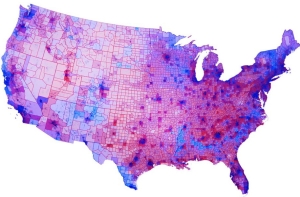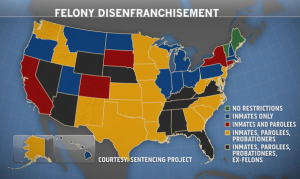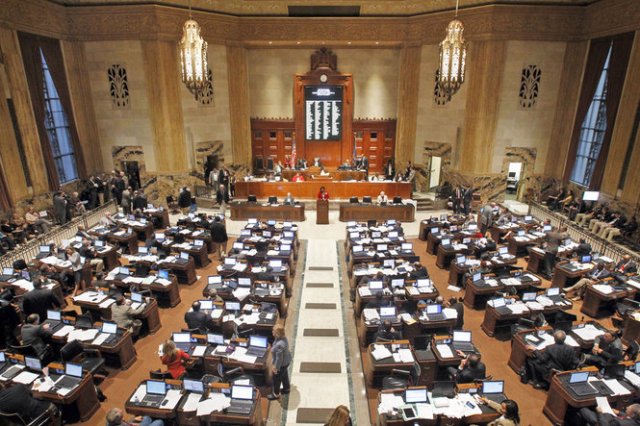There is no need to write an ad hominem synopsis to the unprecedented 2016 Presidential election race, so let’s jump right into it. Those of us who have deep involvement on specific political issues can anticipate what this election means. As an astute political observer and experienced criminal justice reformer, it’s time to collect my thoughts.
It is important to recognize that three ideologies are emerging with surging support now that the charades of the Republicans and Democrats are slipping away and we see the realities of what lies beneath. It would not be surprising, considering these three competing political movements, that 2016 is the final year of a two party system that has reigned supreme since the Bull Moose Party split the Republicans a century ago. Unlike previous third party upstarts, what we now see is a rift in both the mainstream parties, and what we see are the Neo-Fascists, Capitalists, and Socialists.
 Neo-Fascists: “Coming Out” with Pride.
Neo-Fascists: “Coming Out” with Pride.
The basic elements of fascism is (1) scapegoating a minority group (typically ethnic, racial, or religious) as the source of societal problems, along with (2) xenophobia and nationalism spurring the “Us v. Them” schism, that (3) lays the foundation for “strong” military responses to the domestic and foreign targets. Using a War Economy model, there is a short-term economic boom for those benefitting, but it is unsustainable because (win or lose) the carnage created comes back to haunt. A culture must be created to make it safe to say racist things or come out as gay. American closets are fewer and further between.
Criticizing Donald Trump is very easy to do, and dismissing him as a viable electable leader may be rather simple (considering the strong anti-Trump polling), but the backs and heads Trump stands upon are very real. The sentiment of racism and authoritarianism never left America, and politically it morphed from the blatant segregation battles of the 1970s into the domestic “Tough on Crime” and “End Welfare As We Know It” rhetoric (and resulting policies), while saber-rattling against China and invasions in the Middle East. We have lived in the Orwellian nightmare of endless war, the memory hole, and constant double-speak.
Ronald Reagan, H.W. Bush, and Bill Clinton all provided a tidy space for neo-fascism while currying votes linked to “enforcement.” The War on Drugs has actually been a war on communities that includes decades long incarceration, ending social supports to surviving family members, putting police in our schools, excluding people from subsidized housing, continuing the cycle of poverty, stripping entire communities of voting rights and blaming the target of the war for their own demise. Whether working as a prison guard, police officer, district attorney, or cheering from the sidelines: the racist fuel for the War on Drugs has been stockpiling the byproducts for years. Meanwhile, white people have been collateral damage for a punitive criminal justice system that has grown exponentially since the end of Jim Crow and reduction in domestic terrorism (such as lynching).
Put simply, if Rosa Parks were to be dragged from the bus in 2016, the Neo-Fascists would be harping (on social media and mainstream outlets alike) that “She should have just sat in the back of the bus like she is supposed to.”
The Neo-Fascists have grown bolder since September 12th, 2001. Assisted by George W. Bush’s cabal, it became clear that many politicians of both parties could do on foreign policy the same that was done on domestic policy. Criminal justice wasn’t debated for decades, and many civil rights “leaders” became comfortable with the simplistic narratives created by the War on Drugs. Modest debates on foreign policy are often shouted down, as opposition to invasions are deemed “un-American” by people in both parties. Obama’s inability to scale back global American military hegemony shows either (a) the lack of Democratic/Republican rift in foreign policy, (b) acknowledgment that Neo-Fascism is too potent a political force, or (c) a combination of both.
Trump is the hater some Americans have been waiting for. His position in political history is very similar to the rise of the Nazi Party in Germany. A nation has to have enough technological, cultural, and military strength to envision itself as superior to others, to think it can (and should) squash others that stand in the way of the global masters. The Nazis appeared as an irrelevant racist little sideshow, gaining 3% in the elections of 1924 and 1928. Following the Great Depression, the Nazis gained 18% in 1930, becoming the second largest German party. Hitler then ran for president, and two years later the Nazis doubled their support to 37% of the voters.
Trump may not emerge as the genuine leader of the Neo-Fascists if they genuinely rise to power, but he has the charisma and “brand recognition” to consolidate them. The criminal justice policies they would seek will ultimately stay in September 12th mode forever, perpetually striving to get “them.” Like the protagonist in “Memento,” their entire existence is in the attack, the thrill of the chase, the fear rhetoric of the bogeyman- it can never be victorious. More prisons and detention centers. More police and prisons, courts and judges, and contracts for barbed wire, handcuffs, food, and low-grade health services in a world where humans are used for widgets. More desperate releases from prison, oppressive fees, or people living under electronically monitored control. No social safety net. And considering we are already three generations into this debacle, it is a certain recipe to destroy this nation.
 Capitalists: Why solve a problem if you can profit off it?
Capitalists: Why solve a problem if you can profit off it?
The Republicans have historically been seen as the party of the wealthy businessmen, and yet their current top businessman (Trump) has all-too-honestly revealed that he has happily supported both the Republicans and the Democrats. As a personal friend of the Clintons, he exemplifies the fluidity of big money between both parties. To be clear, there is nothing wrong with raking in the cash and nothing wrong with hanging your own shingle. The challenges are at a much higher level, in the billion dollar investments and how the government (through our elected leaders) choose to pursue policies and award contracts based on ideology: More bombs? More schools? More prisons? More hospitals? The tax dollar gets spent, sometimes in ways that help common people and sometimes just to make a few people rich.
The criminal justice system and foreign policy are very similar in that some people are motivated by ideology while others are motivated by profit. Corporations, being collectively owned, only incorporate ideology to the extent that it influences their profits or losses. Collectively, various forces create the pressures to push problems or solutions, or create pretty packages for their solutions which actually only extend the problem. Because the capitalists are throughout both parties, primarily motivated by profit over all else, it has become increasingly difficult to figure out the distinctions between Republicans and Democrats. This is often on display when one party takes over the actions of the previous ruler (“The War on Terror” for example) and the criticisms evaporate, replaced by various justifications.
Republican capitalists needed the support of the neo-fascists to create a large political party, while Democrat capitalists needed the support of unions and People of Color to create a competing dominant party. And vice versa. But now, in 2016, we are seeing these rifts laid bare. The Capitalists are likely to seek out the “conservative Democrats” and “moderate Republicans” (essentially, the ruling ideology of the past three decades) and use their finances to continue pushing their global agenda.
The bipartisan capitalist rule, backed by American military domination infused with an unspoken zeitgeist of white Christian global mastery, is fraying by the Socialist surge and the Neo-Fascist embarrassment.

Socialists: Surging by “Feelin’ the Bern”
Unlike the Green Party candidacy of Ralph Nader, the Democratic primary campaign of Bernie Sanders, a lifelong civil rights activist and seasoned U.S. Senator, is the first genuine chance for a populist takeover of the Democratic Party since Jesse Jackson. In 1984, Jackson ran third with 3.5 million votes (21%) and carried Louisiana, Mississippi, and the District. In 1988, he ran second with 7 million votes (29%) and won eleven contests despite his typically Republican anti-abortion views and problematic statements about Jews. Sanders has already gained 3 million votes and the primary is not even half over.
“A vote for Nader is a vote for Bush,” was the warning to any third party candidate who might try to supplant either of the two parties. Megalomaniac billionaire Ross Perot assured Bill Clinton’s victory in 1992, and both parties naturally recognize that a Trump third party candidacy will similarly ensure a Democratic victory. (A cynic might even question if Trump is a mole sent in by the Clintons, seeking to assure the Democrats’ victory; if the GOP sends Cruz-Rubio to the general election, a third party Trump will carry his Neo-Fascist supporters.)
The Socialists, like the Neo-Fascists, use scapegoats as well. For them it is the capitalists, known as Big Banks, Wall Street, Big Agriculture, Big Pharma and the rest. These are sometimes euphemisms, and other times are accurate accusations that these corporate entities are providing essential services with a profit-first delivery system. The socialists believe certain things should have community controls (food, water, forests, energy, health care, basic housing, etc.) while the law of supply and demand is free to dictate our extras.
Socialists within the Democratic Party have recently been asked to overlook policy ideology due to the very genuine desire to advance racial and gender justice. The election of our first Black president came with hope (for the Socialists) that they could have their cake and eat it too: i.e. Elect the first president of Color and also reign in the banks, stop the wars, overhaul the criminal justice system, and launch universal health care for all. In fact, it wasn’t until candidate Obama came forward as the staunch anti-war candidate did he separate himself from Hillary Clinton in the primary. Meanwhile we saw the Big Bank Bailout, continuation of occupations, a fundamentally unchanged mass incarceration system, and a health care system still controlled by profiteers, much in a manner we might have expected from a Republican president. Eight years later and we see Clinton’s rhetoric moving to the Left and maneuvering so not to be out-flanked again, while some in her camp have famously said there is a “special place in Hell” for women who don’t vote for a woman.
What’s Next?
Pressure can make things explode, but also forge diamonds. As testy and divisive as both party’s primaries appear, this is not all bad. Of course the cynic or conspiracy theorist or crass political calculator is awaiting “the next attack” and who emerges on an aircraft carrier or walking out of the dusty rubble wearing an American flag around their neck. A showing of strength in adversity, particularly “violent” strength (which is obviously not the only form of strength), makes for good footage and historically riles up a crowd. The candidate who could exert that strength may depend on their access to power.
Hillary Clinton is closest to the current administration, and a war hawk herself, so it would not be difficult to affiliate with an expected military reaction, be it foreign or domestic. Sanders may call for a reasoned response and, although Republicans will be called on to rally together as one nation under siege- history suggests that it may be difficult for them to support Obama under any circumstances. Thus, Senators Cruz and Rubio may find it difficult to balance their competing interests and responsibilities when so much of your campaign message is anti-Obama (some would argue that this continual disrespect for our President is unpatriotic), and yet much of your message is also about exerting military force against “them.”
Trump would shine during an attack. His supporters include many paramilitary types akin to the Brownshirt thugs of Hitler’s budding political machine. Trump would have a huge microphone calling for all out attack, and calling the rest of the field (including our President) a bunch of “pussies” regardless of how violent the reaction; there is always a next level. The thought of Trump having access to nuclear weapons must send chills down a trillion global spines. And because it is just as impossible to defeat “terror” as it is to defeat “drugs,” there can be no victory. No peace. Not as long as perpetual war exists and there are enemies to fight.
But maybe there will be no “incident.” Perhaps no ‘agent provocateur’ will emerge in a rally and set off a violent disruption that allows the Neo-Fascists to unleash their punitive desires. If America can last long enough to divide into parties of these three dueling ideologies, people could have a clearer sense of who they should support without so much mixed messaging designed to keep people from caring.
Two days ago, New Orleans made national news for the most “sustained disruption” of a Trump rally to date; this following Louisiana’s infamous KKK leader David Duke publicly urging people to support Trump. Considering the recent judicial ruling to tear down the omnipresent monuments of separatist Confederate leaders, surely some are fully prepared for a chance to clash again, with words or otherwise, as has been the case for over two centuries. And although only 3000 New Orleanians actually voted for the Neo-Fascist, Trump garnered significant support in neighboring parishes, as one might expect after, for example, seeing a group of Black Katrina survivors turned back to New Orleans at the gunpoint of law enforcement.
It is unlikely that the Republicans will allow for the rise of the brazen Neo-Fascist Donald Trump, as a Cruz-Rubio or Cruz-Kasich ticket (with the other bowing out through some other political promise) seems to be an easy combination to slow the engine down. But even if Trump loses his primary in an ultimate “landslide” of 60% – 40%, people will be talking about this power shift, and ask how Republicans can maintain support from those who chant “Build the Wall,” and cheer when he talks of torture. The simple math is that they cannot defeat Democrats without this Neo-Fascist base.
Although Trump seems to have leveled off in his upstart campaign, Sanders has surged as time goes on. Unlike Trump, Sanders has not been the bombastic car wreck from which the world cannot turn away. Trump gets free media, as he is America’s ‘Reality TV Show Goes To Washington.’ Democrats are legitimately torn between several issues, and whether an overthrow or a break away, it is conceivable that Socialist power will arise in America similarly to most other Western democracies that have chosen to prioritize the social safety net.
Clinton has won twelve primaries to Sanders’ seven* (including her win in American Samoa), and gained more delegates (16% to 11%, respectively), yet the primary election is less than half over. In any sporting event, a 12-7 score before halftime does not mean much- especially as the state by state battle is practically even. They are raising money and spending in similar totals, although Clinton has extremely more financial support from Super PACs. Interestingly, the case Democrats love to hate, Citizens United, is working decidedly in Clinton’s favor. More troubling to the conservative Democrats and Capitalists is that Sanders is not being put away despite the Clinton support from the past two Democratic presidents and their massive influence of political power, access to wealth, and media messaging.
*Sanders has since won Maine. Considering Iowa and Massachusetts were practically ties, the score looks more like Clinton 10, Sanders 8, Tie 2.
 Purple States, Civil Rights, and 21st Century Disenfranchisement
Purple States, Civil Rights, and 21st Century Disenfranchisement
The Clintonian Southern “firewall” (as the Clintons poll well in the South) is in states that the GOP would likely carry in a general election, while Sanders wins in the “Blue” states. Over the past few decades, the “Purple” battleground states have included: Nevada, Colorado, Minnesota, Iowa, Wisconsin, Ohio, Pennsylvania, and New Hampshire, along with Virginia, North Carolina, and Florida in the South. Clinton won Virginia and essentially edged out Sanders in Iowa and Nevada, while Sanders won Minnesota, Iowa, and New Hampshire. And while it is interesting that Clinton still is the front runner to be the Democratic nominee, Sanders repeatedly performs better in polls against various Republican candidates. Some of this is based on which candidates encourage voters to turn out, stay home, or defect to the other side in a three-sided debate that only offers two options.
The #BlackLivesMatter movement, essential a re-emergence of the historic American Civil Rights struggle, is born from the ashes of Mike Brown, Sandra Bland, Trayvon Martin, Rekhia Boyd, and so many other names who are likely to be remembered as martyrs of this era. It is fitting that #BlackLivesMatter is seemingly everywhere, as is our nation’s surveillance footage and cell phone videos that have directly contradicted official statements when people have been killed by police.
This 21st century ignition of the Civil Rights Movement comes at a time when it is finally considered politically safe to say the police are occupying communities of Color rather than protecting and serving. It comes at a time when it is considered reasonable to question and unveil the political and economic forces at the root of mass incarceration. It comes at a time when rhetoric is checked through the Internet, and truth has a chance of overcoming propaganda. History matters. Past actions matter. Whether one fought the righteous battle or one drove the struggle into the dirt matters.
If candidates and parties want to gain attention of voters impacted by police in schools, over-aggressive enforcement, long prison sentences, massive collateral consequences, institutionalized racism, and extreme limitations put on the social safety net: they can start by advocating for the voting rights of those impacted people. Those rights become communal, and curtailing them has a collective impact. If a candidate is concerned about offending utterers of the slogan, “The South Will Rise Again,” or doesn’t understand the problem of legal enslavement under the constitution (after conviction of a crime), they probably should not have much space in a Civil Rights discussion. At least not as an advocate of those rights.

*In 2016 Maryland overrode a veto and restored citizenship to people on probation and parole.
Over 6 million Americans have no right to vote based on a past criminal conviction. The majority of them are living in the community as parents, workers, and neighbors. This number is growing, and is reflective of the 80 million people with convictions in America… or more people than it takes to win a presidential election. When a candidate’s actions are aligned with (or opposes) the needs and challenges of those people, we may see a massive shift in political power.
It remains to be seen how much impact Bill Clinton’s mass incarceration policies have on this primary or a potential second Clinton presidency. Much of this history is unknown because mass incarceration negatively impacted people with no political power, and pre-Internet at that, during a time when the Reagan Administration rightfully deserved a reputation for instigating mass incarceration as a response to public health and social issues. There were no partisan arguments over building more prisons, and no campaign debates mentioning prisons or formerly incarcerated people at all. Extremely long prison sentences, doled out over decades, cannot be undone with an apology or a modest federal reform bill. Police are still arresting children for fist fights and making them go to court, partially due to the rhetoric (repeated by Hillary Clinton) about needing to stop these young “Superpredators.” A Supreme Court case finally acknowledging the mitigating factors of youth will not replace school police (created under Clinton’s COPS program) with social workers. “Ending Welfare as we know it,” and excluding people from federally subsidized housing while creating as many as 389 various employment barriers for people with criminal records has had a generationally debilitating effect on low income people, particularly communities of Color, and particularly on mothers who are expected to “hold it down” while their family is plucked bare.
Some Capitalists are finding ways to profit off “rehabilitation,” even when a smoke screen operation is as effective as Trump University. Some Libertarians see the encroachment on civil rights in a race-neutral manner, just as many Conservatives can no longer look away as they now understand the vast tentacles of a domestic criminal justice policy based on punishing “them” rather than searching for win-win solutions among our neighbors. Regardless of the way people come to these issues, those leading the solutions should be the most bona fide, rather than the one who only recently realized their own past approaches were wrong. Some of these experienced people will likely have suffered through gauntlets, be they direct victims of crimes or victims of punishments, they typically are from the same over-policed communities.
Whether we get three parties for the future or two parties being nibbled away by competing views of America, the upstart outsider candidates allow us to finally talk about these issues in an honest and open manner.
 The Rent is Too Damn High. You heard Jimmy say it when he ran for Governor of New York (representing “The Rent is Too Damn High” party, no less), and it is increasingly true with every passing day. Want to do something to help social justice? Want to be part of sustaining the Movement? Lower the damn rent.
The Rent is Too Damn High. You heard Jimmy say it when he ran for Governor of New York (representing “The Rent is Too Damn High” party, no less), and it is increasingly true with every passing day. Want to do something to help social justice? Want to be part of sustaining the Movement? Lower the damn rent.
 I can relate with Michelle Carter.
I can relate with Michelle Carter. It is widely known that Louisiana is the most incarcerated state in the world. This means massive numbers of families and communities have members struggling with a lifetime punishment. Fortunately, we are in an era of reform and the work of a statewide Justice Reinvestment Task Force is now into the legislative session. From now until June 16th, VOTE will be monitoring and weighing in on 31 separate pieces of legislation.
It is widely known that Louisiana is the most incarcerated state in the world. This means massive numbers of families and communities have members struggling with a lifetime punishment. Fortunately, we are in an era of reform and the work of a statewide Justice Reinvestment Task Force is now into the legislative session. From now until June 16th, VOTE will be monitoring and weighing in on 31 separate pieces of legislation. Just like that, America voted for “Change” yet again. Those of us working in the social justice arena, working on our own form of change, are all checking pulses of the people around us, wondering “What does this mean?” The following are some initial thoughts, as someone who has confronted the criminal justice system during the Clinton, Bush, Obama, (and soon-to-be) Trump eras.
Just like that, America voted for “Change” yet again. Those of us working in the social justice arena, working on our own form of change, are all checking pulses of the people around us, wondering “What does this mean?” The following are some initial thoughts, as someone who has confronted the criminal justice system during the Clinton, Bush, Obama, (and soon-to-be) Trump eras. There can be little doubt that a cultural rise of Punishment-Politicians led America to be the peculiar mass incarcerator of the world. This has not been confined to one geographic area, nor to only locking up people of Color. It has been a Movement, which is best described as a force larger than the sum of its parts. So, although racism, slavery, Puritanical brimstone, Native American genocide, drug hysteria, capitalist elitism, militant nationalism and genuine safety concerns have all been key elements to building the American prison gulag… it has been successful because these things do not exist in isolation.
There can be little doubt that a cultural rise of Punishment-Politicians led America to be the peculiar mass incarcerator of the world. This has not been confined to one geographic area, nor to only locking up people of Color. It has been a Movement, which is best described as a force larger than the sum of its parts. So, although racism, slavery, Puritanical brimstone, Native American genocide, drug hysteria, capitalist elitism, militant nationalism and genuine safety concerns have all been key elements to building the American prison gulag… it has been successful because these things do not exist in isolation.
 Neo-Fascists: “Coming Out” with Pride.
Neo-Fascists: “Coming Out” with Pride. Capitalists: Why solve a problem if you can profit off it?
Capitalists: Why solve a problem if you can profit off it?
 Purple States, Civil Rights, and 21st Century Disenfranchisement
Purple States, Civil Rights, and 21st Century Disenfranchisement


2016: The year of voting rights, public defenders, sentencing reform, and Albert Woodfox
The Epicenter of Race, Voting, and Mass Incarceration
Prior to the Civil War, there was no need for convict labor for large public projects such as the levee system. There was also no need to disenfranchise massive numbers of people when elections came down to contests between wealthy white men. The slave system maintained the status quo for as long as historically possible. Too long, of course. And where power is threatened, the powerful will generally take action to assure threats are eliminated.
In 1868, Louisiana expanded the class of convicted people who were denied voting rights. It went from the white men who were convicted of forgery, bribery, and perjury to barring all men (Black or white) who were “under order of imprisonment.” Meanwhile, the labor force continued nearly uninterrupted because the 13th Amendment allowed slavery to continue as long as people were convicted of crimes. As one plantation owner famously remarked, “before we used to own them. Now we just rent them.”
The equation is simple:
Conviction + Disenfranchisement = Hard Labor – Political Power to Change.
This arrangement went largely untouched for 150 years. Along the way, Louisiana became the most notoriously creative in ways to suppress Black voting while also building up the disproportionately largest gulag in the world. Poll Tax, Grandfather Clause, Understandings Clause, and outright murder were some of the most well known tactics to maintain power, but people should recognize that Louisiana is one of only two states that allow a non-unanimous jury for convictions.
When Albert Woodfox, Herman Wallace, and Robert King were organizing in the early 1970s to ease the oppression of legally enslaved people at the Louisiana State Penitentiary, when they were organizing under the most logical banner of the Black Panthers, their demise was practically assured by history. Surprisingly, they were not outright murdered and joined a long lineage of activists that did not begin with Dr. King, Malcolm X, or Fred Hampton. And just as surprisingly, they survived the initial backlash to a wrongful accusation of killing a prison guard, unlike Emmit Till, Trayvon Martin, Mike Brown, Eric Garner, or Tamir Rice (none of whom were accused of killing a law enforcement officer). Miraculously, they overcame horrid conditions of oppressive incarceration, unlike Sandra Bland, Freddie Gray, and Gynnya McMillen- none of whom, mysteriously, even made it past the police station. It is amazing that they were not gunned down in the prison yard like George Jackson, a Black Panther incarcerated in California, that led to the 1971 Attica Prison Riot in New York.
The Right to Defend Against Government Accusations
One can look back at the early 1970’s and reasonably conclude that Woodfox, Wallace, and King never had a chance. What we need to know, however, is would they have a chance today? Woodfox had a second trial, a second one where the state acted so unfairly it was also thrown out by reviewing courts. Today politicians use a budget crisis as a reason to underfund the constitutionally mandated right to counsel, and yet the government is not using that same crisis to close down prison and jail cells.
Those wondering why the ACLU is suing the Orleans Public Defender and the state body that funds the public defenders need to realize it is actually a person denied counsel who is suing. Such a person is the only one with a right to sue, as the right attaches to the person accused of a crime. As it happens, this plaintiff’s claim impacts us all. Will we get a lawyer? Will the 300 people, whose childhood sentences of Life Without Parole were recently thrown out, get lawyers? Would Woodfox have gotten a proper team appointed for a third trial? One way to keep the equation going is to overwork the defense side and continue the conviction system as originally designed. But it is not all static, of course. Slave labor may not be the needed outcome of the equation anymore, as it has some new variables:
(Accusation – Funded Defense Team) +
(Vigorous Police Investigation x Political Ambitious District Attorneys)
=
Convictions +
Prison Employment +
Contracts for Services (Medical, Food, Telecommunications, Sanitation, Transportation)
+ Incarcerated People Who Are Not “Unemployed”
The public defender has no “right to defend,” thus a demand made upon them, to be passed along to the state budget crunchers, must come from the people with constitutional rights: defendants. While Louisiana struggles with a budget crisis, they can think about the multiple millions of dollars spent trying to maintain the wrongful convictions of the Angola 3 (and many others), and the cellblocks dedicated to wrongful convictions, think of the children sentenced to die in prison, along with Orleans District Attorney Leon Cannizaro and Jefferson Sheriff Newell Normand’s recent comments: about how easing marijuana possession enforcement will basically send New Orleans into a murderous crime spree. Rather than tie marijuana to Doritos, as most Americans do, these out-of-touch elected leaders tie this drug (legalized in several states) to guns.
Marijuana is a “gateway drug,” but not to some realm of intoxicated violence and the bloody business of unregulated commerce. It is a gateway drug to the criminal justice system, where someone gets a “strike” or probation status that forever erodes future constitutional rights.
Peeling Back 150 Years of Construction
Taking a public health approach to the problems our criminal justice system has helped create and exacerbate will not happen overnight. It will come through changes both modest and bold. We need a combination of increased rights, services provided, inspiration, and reducing the punishments. In some cases, punishment needs to be outright eliminated.
Louisiana, Minnesota, and Florida are currently moving towards a citizenship dilemma that will never go away until resolved: When will people living in our communities, on probation or parole, have voting rights- the most basic element of citizenship and democracy. Until this mass of people (over 70,000 in Louisiana) have this tenet of citizenship we will always feel excluded, and be excluded. This exclusion extends to our children, into our friendships, and impacts our workplaces.
Maryland’s legislature recently voted to override their governor’s veto, restoring citizenship to all people who are outside of prison and living in the community. Kentucky, however, has restored then reversed voting rights by executive orders; proving the tenuous nature some view this fundamental cornerstone of democracy.
Those who oppose voting rights don’t believe in democracy.
They are simply un-American.
While very fundamental questions linger about allowing people back into the community from where we come, some make moves on reducing punishments. It is not possible for the 80 million convicted Americans to undergo the brutality, including decades in torturous solitary confinement, suffered by the Angola 3. The taxpayers cannot afford it, the communities cannot absorb it, and the individual families cannot survive it.
President Obama recently eliminated solitary confinement for children in federal custody. Acknowledging that sensory deprivation amounts to torture is a significant moment in mainstream political history, and hopefully our leaders will soon recognize that torture should not be tolerable on our adults. Hopefully state leaders will follow federal leaders, who should be incentivizing such reductions in brutality in the same way federal dollars contributed to the massive spending boom required to build mass incarceration as we know it.
The federal government is close to passing a sentencing reform act that would apply to their federal prisoners. It is important for people to understand that such federal initiatives DO NOT apply to people in state custody, as each state has its own set of independent state laws that are only limited by the U.S. Supreme Court’s interpretation of “cruel and unusual punishment” and protected rights of defendants.
Those who wonder what each of the latest federal bills “will do,” they should be asking the interpretations by impacted people- those who have a stake in the actual success of the litigation beyond claiming victory in its passage. As one would expect, federal legislation often doesn’t begin by asking for too much and typically gets watered down further in the process. If a bill has a modest, but genuine, impact it should be embraced as such rather than over-hyped in a manner that leads people to wash their hands and proclaim a job “well done.”
The federal Fair Sentencing Act will immediately impact some people, and represent a downward trend in sentencing laws, but will not go much further in producing lasting reductions in mass incarceration. Reducing the mandatory minimum on 1kg of heroin / 5kg of cocaine / 280g crack / 50g meth (from ten years to five) will only help the few people who may be serving under ten years for such a major amount of hard drugs. Similarly, the reduction on 100g of heroin / 500g of cocaine / 28g of crack / 100 marijuana plants / 5g of meth (five years minimum to two) will only help those few people where the judge would have given them less.
Doing What You Can, Where You Can
As VOTE’s executive director Norris Henderson always says, “Get in where you fit in.” Some will work on citizenship while others on sentencing. Some gravitate to addiction services and others need to build homes, but ultimately we need to be building our community in ways that involves us all, that puts us all in it to win it, collectively ensuring injustice does not occur.
Welcome home Albert Woodfox.
May you live a long and peaceful life full of all the things you hold dear.
May your spirit guide us along the arc of humanity, the one that bends towards justice.
May you grow ever stronger through vindication.
Share this: